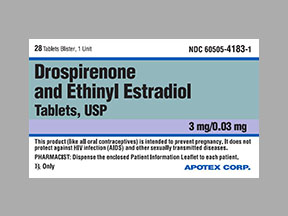Zumandimine is a limited distribution medication.

Zumandimine Coupons & Savings Card – Discount Prices from $2.69
Brand for: Drospirenone-ethinyl estradiol
My prescription
Edit
3-0.03MG, Drospirenone-ethinyl Estradiol (1 Tablet)
Select pharmacy

CVS
$18.36
COUPON PRICE
Walmart
$2.69
COUPON PRICE
Albertsons
$3.95
COUPON PRICE
Walgreens
$4.25
COUPON PRICEZumandimine savings card
Show this card to your pharmacist
Walmart
$2.69
BIN
ID
PCN
GRP
019876
LH6A8D5B34
CHIPPO
LHX
Powered by
Zumandimine (Drospirenone-ethinyl Estradiol) dosage forms
Dosage Quantity Price from Per unit 3-0.03MG 1 Tablet $2.69 $2.69 3-0.03MG 2 Tablets $2.88 $1.44 3-0.03MG 3 Tablets $3.07 $1.02 3-0.03MG 4 Tablets $3.26 $0.81 3-0.03MG 6 Tablets $3.64 $0.61
| Dosage | Quantity | Price from | Per unit |
|---|---|---|---|
| 3-0.03MG | 1 Tablet | $2.69 | $2.69 |
| 3-0.03MG | 2 Tablets | $2.88 | $1.44 |
| 3-0.03MG | 3 Tablets | $3.07 | $1.02 |
| 3-0.03MG | 4 Tablets | $3.26 | $0.81 |
| 3-0.03MG | 6 Tablets | $3.64 | $0.61 |
What is zumandimine used for?
Zumandimine is used as an oral contraceptive to prevent pregnancy. It contains a combination of hormones, ethinyl estradiol and drospirenone, which work by inhibiting ovulation, altering the cervical mucus, and changing the uterine lining to prevent fertilization and implantation.
Does Zumandimine help with acne?
Yes, Zumandimine, which is a combination oral contraceptive, can help with acne. It contains hormones that can reduce the production of androgens, which in turn can decrease the amount of oil produced by the skin, potentially improving acne. However, it is important for individuals to consult with their healthcare provider to determine if this medication is appropriate for their specific situation.
Using the SaveHealth discount card, what is the price of Zumandimine without insurance?
Using the SaveHealth discount card, the price of Zumandimine without insurance is $2.69.
What is the price of Zumandimine at CVS?
The price of Zumandimine at CVS is $18.36.
What is the price of Zumandimine at Walgreens?
The price of Zumandimine at Walgreens is $4.25.
What is the price of Zumandimine at Walmart?
The price of Zumandimine at Walmart is $2.69.
